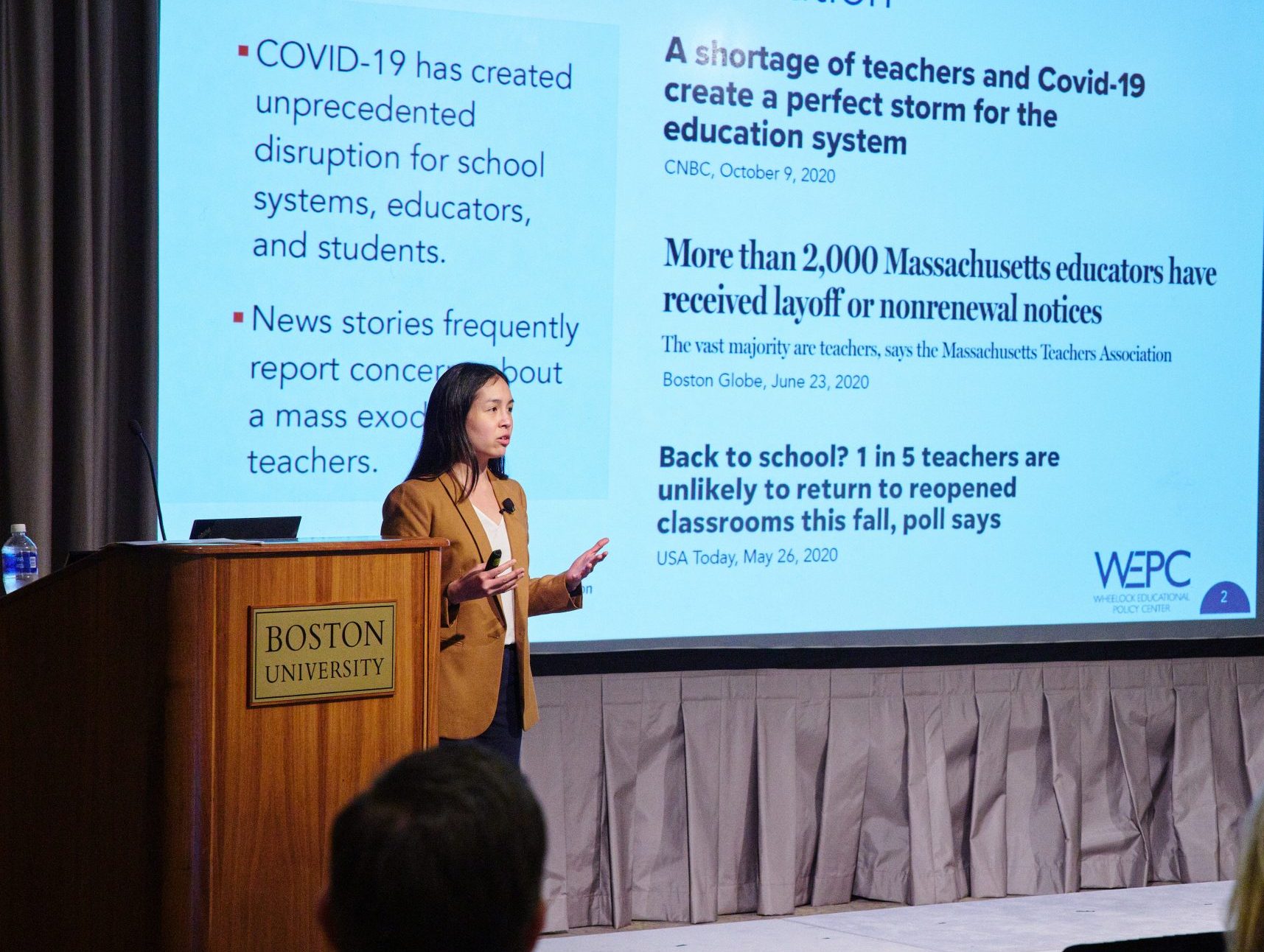Improving Policies That Support Teachers

Improving Policies That Support Teachers
Olivia Chi explores teacher labor markets, measures of teacher quality, and policies that reduce inequity
Olivia Chi is an assistant professor of educational leadership & policy studies at BU Wheelock. Her research uses quantitative methods to study the economics of education, with a focus on teacher labor markets, measures of teacher quality, and policies that reduce educational inequality. Chi is affiliated faculty with the Wheelock Educational Policy Center.
Q&A
Question: What is your research focus?
Chi: I study teacher labor markets, teacher quality, and teacher evaluation. I am broadly interested in studying the teacher pipeline and diversifying the teacher pipeline.
Question: What is a favorite finding or study that you produced, and why is it your favorite?
Chi: One of my favorites is a recently completed paper, where I look at the effect of race and gender matching between teachers and their raters in the context of teacher classroom observations. To give some background, classroom observations have become the cornerstone of post-No Child Left Behind teacher evaluation reforms. To conduct classroom observations, it is quite common for an administrator, such as a principal or assistant principal, to come into the classroom, observe a teacher’s lesson, and then rate the teacher on a rubric.
My study examines whether teachers receive higher or lower scores on these rubrics as a result of sharing race or gender with their evaluators. I found that sharing race or gender leads to a small positive increase in teacher observation scores. This raises fairness concerns for teachers whose race or gender identities are not reflected in their raters. This is just one step in further understanding the race and gender dynamics between teachers and their supervisors.
Question: What is an important implication of the work you do?
Chi: A broad implication from the paper I discussed on race and gender matching in classroom observations is that race and gender dynamics between teachers and supervisors are important to study, and we need to learn more about how they impact the teacher pipeline. The school leaders who are conducting classroom observations are also responsible for other big picture decisions that matter for the teacher pipeline. They make decisions about hiring new teachers for their school, how to develop teachers’ skills, which teachers to retain, and which teachers to recommend for promotions to leadership positions.
It is possible that the race and gender dynamics that are at play in classroom observations are also relevant at other stages, such as during the interview process, where administrators may see applicants’ demo lessons. I wonder, for teacher applicants who do not match the school administrators in terms of race or gender, how does that affect their chances of being offered a job at that school? In other words, some next steps are thinking about whether and how race and gender dynamics impact other parts of the teacher pipeline.
Question: What drives you to conduct your specific research?
Chi: I am passionate about thinking about policies that will reduce educational inequities. At the end of the day, I want to do research that will positively impact kids’ outcomes. And as a former teacher, I am motivated to think about how we can improve policies surrounding teachers.
Prior to graduate school and a research career, I was an elementary teacher in New Haven, Connecticut. So many state-, district-, and school-level policies impacted my daily life and my colleagues’ daily lives, and I saw how specific policies played a role in teacher retention, the teacher culture, and how teachers interacted with students. It made me wonder, what are the levers that can make things better for teachers, so that teachers can make things better for students.
Question: What are some challenges that you have encountered in your research?
Chi: I work with large administrative data sets that come from states or districts. As I work closely with partners in states and districts, it is important to develop mutually beneficial partnerships. As a researcher, I want to make sure that the work I am doing is policy relevant for them, while also making sure that I can address unanswered questions from the research literature.
Bridging the world between research and practice can be challenging. Sometimes the questions at the forefront of my personal research agenda are not exactly top priority for the partners I am working with. As a result, it can take time to find the right mutually beneficial project. However, at the end of the day, it is a necessary challenge when doing this type of work, as I want my work to be helpful for policymakers.
Question: Where is your research headed?
Chi: I have a couple of exciting things I am working on! Together with my colleague, Professor Andrew Bacher-Hicks, we have started to examine how the composition of the Massachusetts teacher workforce has changed during the pandemic . Also, together with Andrew Bacher-Hicks and Ariel Tichnor-Wagner from BU Wheelock, we will be working with the Massachusetts Department of Elementary and Secondary Education to examine the role of emergency teaching licensures, which were created in response to how the pandemic prevented individuals from fulfilling the requirements needed to obtain traditional licenses. I am also currently working on an evaluation of a virtual teacher coaching model. Finally, I am getting started on an evaluation of a leadership pipeline program in an urban school district.